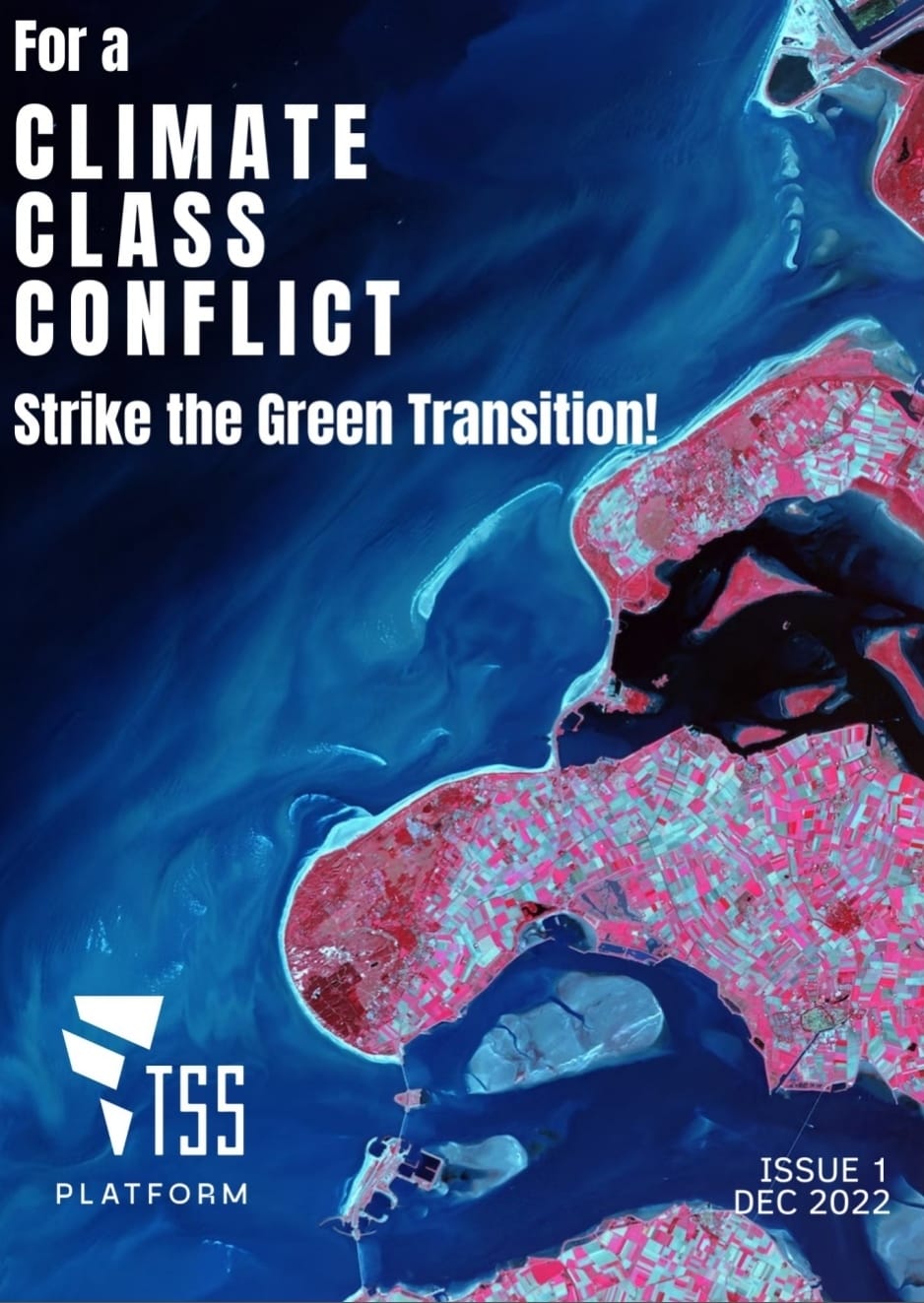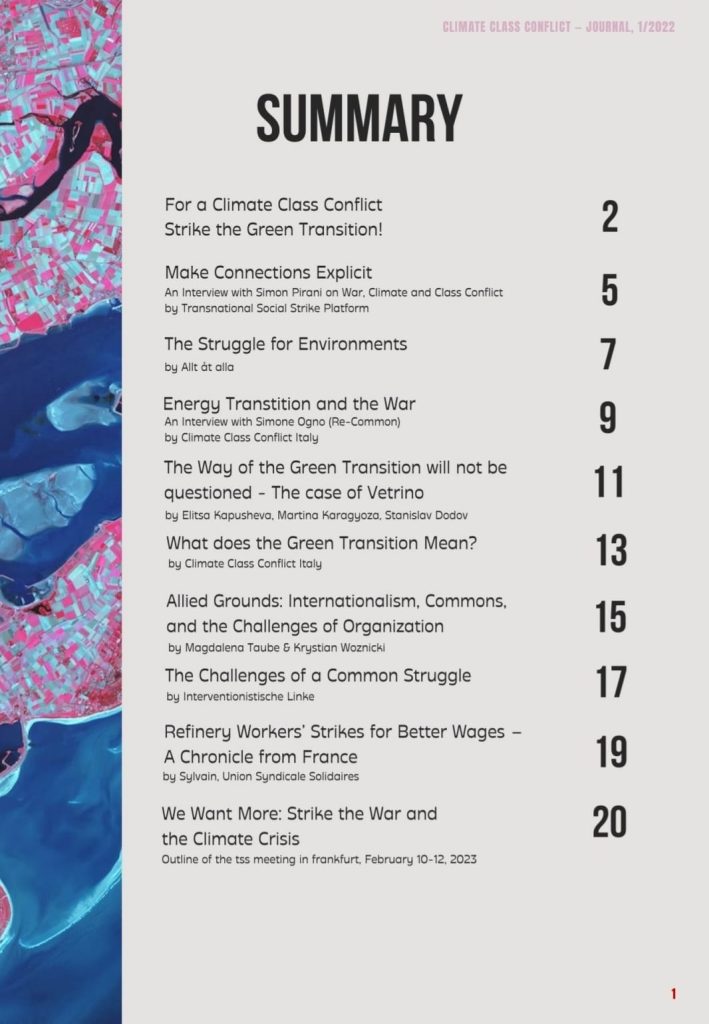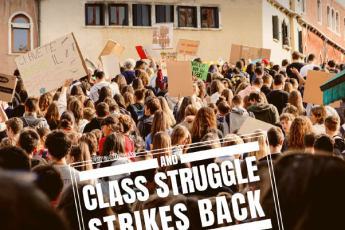
by TSS Platform
Introduction
The green transition haunts our political initiatives. It forces us to engage with the systemic meaning of ecology and the manifold effects that changes on the relationship between production, reproduction, and the environment have on our lives. The green transition is a battlefield that reshapes boundaries and possibilities for social movements, unequivocally demanding to take a stance. It rearticulates production and social reproduction under the ideological banner of managing climate change, while it materially sets the environmental conditions for capital accumulation in times of intense crisis. As it regards capital accumulation, the green transition is about logistics, industrial production, and wage conditions, as well as regulation of migrants’ movement and labour and women’s reproductive work. Just pick your poison: you can find all societal hierarchies and processes we have always contested when you look at the way climate change is managed. For us, fighting for ‘climate justice’ means tackling the problem of how the climate crisis is exploited by governments and capital to reproduce inequalities and seal their legitimacy. It means to accumulate the power we need to bring about a truly radical transformation. This is not a task for climate ‘specialists’ only, nor for territorial struggles disconnected from what happens elsewhere. This is the task for a transnational social movement fueled by a mutual understanding of both the most compelling political urgencies people face, and the way to connect them. This journal aims at opening a space for discussion on how a transnational climate class conflict shall look like.
A transnational climate class conflict is not something that we already have, it is what we need the most. This does not mean that we start from scratch. We are all part of climate movements or organisations which have their own international links, and which have made ecology a fundamental terrain of struggle in these past years. This has been made possible by the widespread claim for a future of social and climate justice against governments and capitalists trading it with comfortable profits here and now. This has been made possible by countering the narrative of a green transition that promises to deliver a NetZero future while it keeps subordinating and exploiting workers, women, and migrants and appropriating resources for the sake of profits alone. Many practices have been embraced by the climate movement, from blockades to climate camps and global strikes. At the same time, workers’ strikes and protests in the transport, mining, fossil fuel and coal sectors, against the worsening of working conditions legitimised under the banner of the green transition urge us to think how to stretch the limits of our initiatives. Workers striking in order not to lose their jobs are struggling against a system that pits their interests against the ecological needs of all through the imperative of the green transition. They face the same system that climate activists want to change, a system whose reproduction weighs on the free labour of women and on the wages of all workers. Here lies a potential connection that must be politically constructed and practised. Let us be clear on this: the task of climate activists is not that of ‘teaching’ others how to lead the struggle; rather, as German comrades from IL point out, they have to contribute in building «credible, actionable and concrete alternatives to the dominant narrative» that help overcoming differences. Our transnational climate and class initiative must come to terms with this, and build a power out of the political connection of those differences.
This is why we think that a refusal of climate-change policies must be part of a struggle against a war which is fought with actual weapons in Ukraine, and with economic and political weapons all over the world. Today, a struggle to change the climate of violence that the war is legitimising is a struggle to build the conditions for a class conflict that is otherwise suffocated by national conflicts. Under the threat of energy ‘insecurity’, the pace and scope of the green transition planned by the EU and national governments has changed, aiming at subduing any practical contestation of its effects to the superior interest of building a stronger Europe within the war.
The strike is one of the political tools ecological movements have been embracing in these years to express their refusal against capital and States’ unwillingness to put ‘system change’ before ‘climate change’. While it is as clear as ever that no government will deliver a ‘just transition’ out of this society polluted by capitalist, sexist, and racist hierarchies, what we can expect from a climate strike is still a matter of discussion. The global movement of the feminist strike against patriarchal violence has deeply contributed to widening the meaning and scope of the strike as a social process that aims to hit the pillars of the violence that continually reproduces society. We think that in order to keep growing, the process of the climate strike must be able to grasp the lines of climate and class conflict that crisscross the transnational sphere, so as to strengthen the refusal to submit to the whole set of social conditions imposed by the green transition. It must have the ambition of connecting the struggles in workplaces—and there are many already happening within and against the energy and fossil sector, as the French case demonstrate—with those taking place in all terrains impacted by the green transition, and go beyond the limits of national or localised disputes.

As comrades from Bulgaria point out in their contribution, this was the case of the large wind park investment project in Vetrino, sponsored by the Australian renewables developer CWP Global. This case shows the way in which renewable energy projects replicate practices of creating dependencies from the extractive industry, thus making green and energy neoliberal policies a way to reinforce existing hierarchies. Local communities are hit by these transnational movements of capital that now seek new opportunities for accumulation in the ‘green’ sector and are left unarmed and powerless in the face of a transition presented as necessary and unquestionable. Swedish comrades from the organization Allt åt alla move from their own territory as well, by questioning the idea of what is commonly conceived as ‘the environment’ in order to stress the link between capital exploitation of nature and people. The governance of mobility within diverse spaces and environments reproduces social and territorial hierarchies. While consolidating capital’s domination over different conditions, this fragments our struggles. Our challenge is to articulate ecological, labour, and social struggles in a transnational initiative that reclaims our own environment, to be built on what comrades from Germany call “common grounds”. So, their question can resonate in all of our reflections: “how can we advance an internationalism that derives its common denominator from our shared experience of separation?”
Certainly, the war is a radical experience of separation. Among the worldwide effects that Putin’s war in Ukraine is having, there is the multiplication of divisions among social movements. This makes our process of transnational organisation much more difficult and shows the importance of refusing the very logic of war. At the same time, the war is practically changing the way the green transition is both legitimised and delivered. Even when it is not materially connected with a given national or local policy, the war affects our daily life since it is used to justify gas prices going sharply up or the economic support for fossil fuels extractions which will only work for oil companies and trash climate targets. As pointed out by the two interviews from Italy and the UK, the war introduced several discontinuities in European energy plans. Simone Ogno (ReCommon) suggests that the inability to tap into Russian gas led European governments to move from Russian authoritarianism to similarly authoritarian suppliers like the United Arab Emirates; on the other hand, it justified the revival of fossil fuels. Referring to the situation in Germany, the interview highlights the connection between this return to fossil fuels and the worsening living, health, and working conditions of those employed in the mines and those living in the affected areas. At this stage the tension between the need to leverage the transition to become autonomous from Russian gas and the need to make use of immediately more efficient energy sources keeps the priority of accumulation intact. In this perspective, what Simon Pirani argues about the ongoing plans for Ukrainian post-war reconstruction is crucial. While Putin’s war is hitting not only the State, but the whole Ukrainian population, the EU is starting to organise the neoliberal transformation of Ukraine’s energy system, to make it apt for the single-market needs. This shows that the green transition is part and parcel of the climate of war that the EU and other states are fueling around the world, with growing militarism, violence and nationalism being the main targets that a transnational politics of peace, for social and climate justice has to confront. Our climate and class effort should move toward making political and transnational connections explicit, so that we can cope with entangled conditions of subjugation and subvert them.
As comrades from Italy point out, “the war is imposing its own ecology,” which is also visible in the reaffirmation of the centrality of logistics for the accumulation of capital. This urges us to decentralise our gaze when we look at projects such as big highroads, wind parks, port expansions, tunnels, gasifiers etc. that directly affect the environment we live in. A climate strike that refuses such ‘green’ projects cannot avoid the task of unveiling the conditions lying behind these supposedly ‘technical’ or ‘necessary’ decisions, highlighting what the green transition systematically hides. Protests silenced in the name of making an environment attractive for big corporate investments; workers blackmailed or directly fired to make space for a better-fitting workforce in a transformed production; phase-out processes for fossil fuel that mainly put a new-fashion green hue over old-fashioned financial and extractive profits; imposed cuts on energy consumption that will hit the most those who already bear the weight of social reproduction, namely women and migrants. We cannot successfully confront any of these obstacles to our political initiatives without facing the unavoidable challenge represented by the transnational dimension that produces them. We need to make our ecologism a way to transform this challenge into an opportunity.
With all these issues in mind we will organize in the framework of the TSS Transnational Meeting in Frankfurt am Main, Germany, from February 10 to 12, 2023, workshops and discussions on our climate class conflicts to come and their constitutive relationships with other struggles in social reproduction and against the war. This Journal is thus an open tool that can trigger further moments of sharing experiences and perspectives towards the Frankfurt meeting. Anyone who feels like contributing to the Journal or wants to be part of this TSS initiative can reach us, as we are open for collectively writing more issues of the Journal with interviews, reports, articles, or any material that tells of ongoing climate and class conflicts and want to express their connection with other struggles. To strike the war, the climate crisis, and the green transition, we need a transnational climate class conflict!





